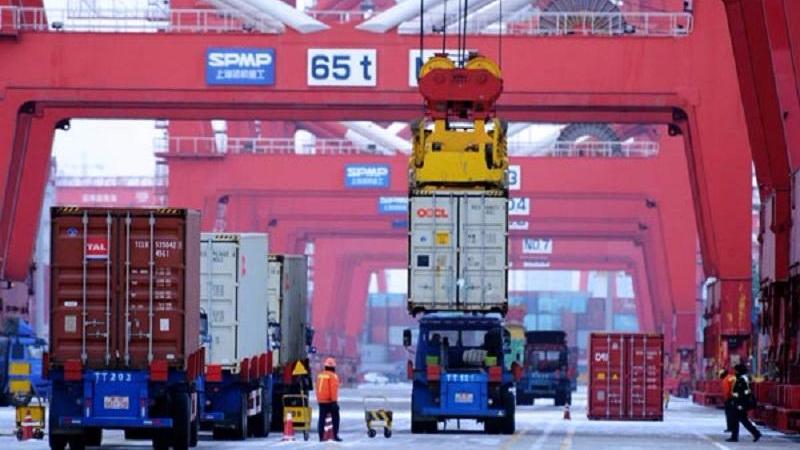Media Report

- The Wall Street Journal comments: "Steve Bannon, the recently departed White House chief strategist, asserts that, 'We're at economic war with China.' If that's the case, Beijing seems supremely confident of victory. Eight months into a Trump presidency, the Chinese leadership has offered a few gestures to placate the U.S.—lifting a ban on U.S. beef was one—while pressing its advantages on all fronts in its competition with the West for industrial dominance. Expect one or two more headline-grabbing concessions; Beijing is gearing up for a splashy announcement on electric vehicles, which may help Tesla. In Beijing this week, U.S. Commerce Secretary Wilbur Ross said he hoped for 'very good deliverables,' when Mr. Trump visits in November. But China sees competition as a zero-sum game. It flaunts its indifference to the West's complaints almost gratuitously, as in Shanghai's recent ban on soft-cheese imports, which sent French chefs on a hunt for local brie and Roquefort to fill their dessert trolleys. Foreign businesses are on notice that they are tolerated in China only for as long as they serve Chinese state goals. Even as President Xi Jinping promises to 'push forward market opening faster,' his 'Made in China 2025' plan has the overt aim of displacing foreign manufacturers in critical areas like robotics, medical equipment and driverless vehicles... This is the behavior of a government that senses it has the upper hand."
- Financial Times reports: "When a mix of Chinese privately owned and state-owned companies came together in August to buy shares in China Unicom's $11.7bn offering, Beijing heralded it as another milestone for reform of country's state-owned enterprises. It certainly marks another step in the blurring of the line between private enterprises in China and SOEs. Sadly, the blurring is in the wrong direction. Rather than freeing up state enterprises to act more efficiently, the latest step move by Beijing is all about asking private companies to subsidise them... For fund managers sitting outside China, Beijing's latest scheme is highly perverse. The plan gives investors far more of an incentive to sell the stock of those companies that are more vulnerable to be enlisted to support the likes of China Unicom, and look for those that are less vulnerable... Perhaps the 19th Party Congress will adopt more significant and progressive reforms when it gathers next month. But for now, it seems that China's so-called reform policy is moving in only one direction — backwards."
- CNBC reports: "It is no secret that the bulk of Ivanka Trump's merchandise comes from China. But just which Chinese companies manufacture and export her handbags, shoes, and clothes is more secret than ever... In the months since she took her White House role, public information about the companies importing Ivanka Trump goods to the U.S. has become harder to find. Information that once routinely appeared in private trade tracking data has vanished, leaving the identities of companies involved in 90 percent of shipments unknown... The deepening secrecy means it's unclear who Ivanka Trump's company is doing business within China, even as she and her husband, Jared Kushner, have emerged as important conduits for top Chinese officials in Washington. The lack of disclosure makes it difficult to understand whether foreign governments could use business ties with her brand to try to influence the White House — and whether her company stands to profit from foreign government subsidies that can destroy American jobs. Such questions are especially pronounced in China, where state-owned and state-subsidized companies dominate large swaths of commercial activity."
Calendar
- 2017-09-25 U.S. hopes for 'good deliverables' during Trump's China visit
- 2017-09-24 The nuclear threat can be contained by diplomacy
- 2017-09-20 China finds Trump threats to North Korea unhelpful
- 2017-09-19 Why China's Xi Jinping is missing from the U.N. General Assembly
- 2017-09-18 Korean peninsula draws range of military drills in show of force against North Korea
- 2017-09-15 China is getting tougher on North Korea—to stop the US from getting tougher on it
- 2017-09-14 Trump Blocks China-Backed Bid to Buy U.S. Chip Maker
- 2017-09-13 Trump says UN North Korea sanctions are 'not a big deal'
- 2017-09-12 After U.S. Compromise, Security Council Strengthens North Korea Sanctions
- 2017-09-11 Indonesia, Long on Sidelines, Starts to Confront China's Territorial Claims
News
- Financial Times China's state-owned business reform a step in the wrong direction
- CNBC Ivanka Trump's China business ties are more secret than ever
- Financial Times China 'strongman' Xi to put stamp on Communist charter
- Fortune China Has Blocked Most WhatsApp Service as Screws Tighten on Internet Use
- Quartz The new satellite image of Earth on WeChat's splash page features China at its center—for a reason
- NPR Wary Of Unrest Among Uighur Minority, China Locks Down Xinjiang Province
- CNBC China fines tech giants for not censoring banned content ahead of October's party congress
- The Washington Post China hosts Interpol meeting amid concerns over abuse
- CNBC US Commerce Secretary Wilbur Ross says trade friction with China can be resolved through talks
- Quartz Please don't bribe the officials: Singapore's Chinese embassy has some etiquette rules for mainland tourists
- Bloomberg Bitcoin and Copper in Lockstep Show Chinese Speculators' Power
- Quartz As China has boosted renewable energy it's moved dirty coal production to Africa
- ABC News China postpones food import controls after global outcry
Commentary
- The Wall Street Journal If This Is a Trade War, China's Winning
- ChinaFile China, Global Peacemaker?
- Lawfare Shrinking Anonymity in Chinese Cyberspace
- China Law Blog China Employee Probation the Second Time Around
- Lawfare The South China Sea and China's "Four Sha" Claim: New Legal Theory, Same Bad Argument
- The New York Times Snapshots Along the River Where China Meets North Korea
- Forbes Why China's Ban On Bitcoin May Be Temporary
